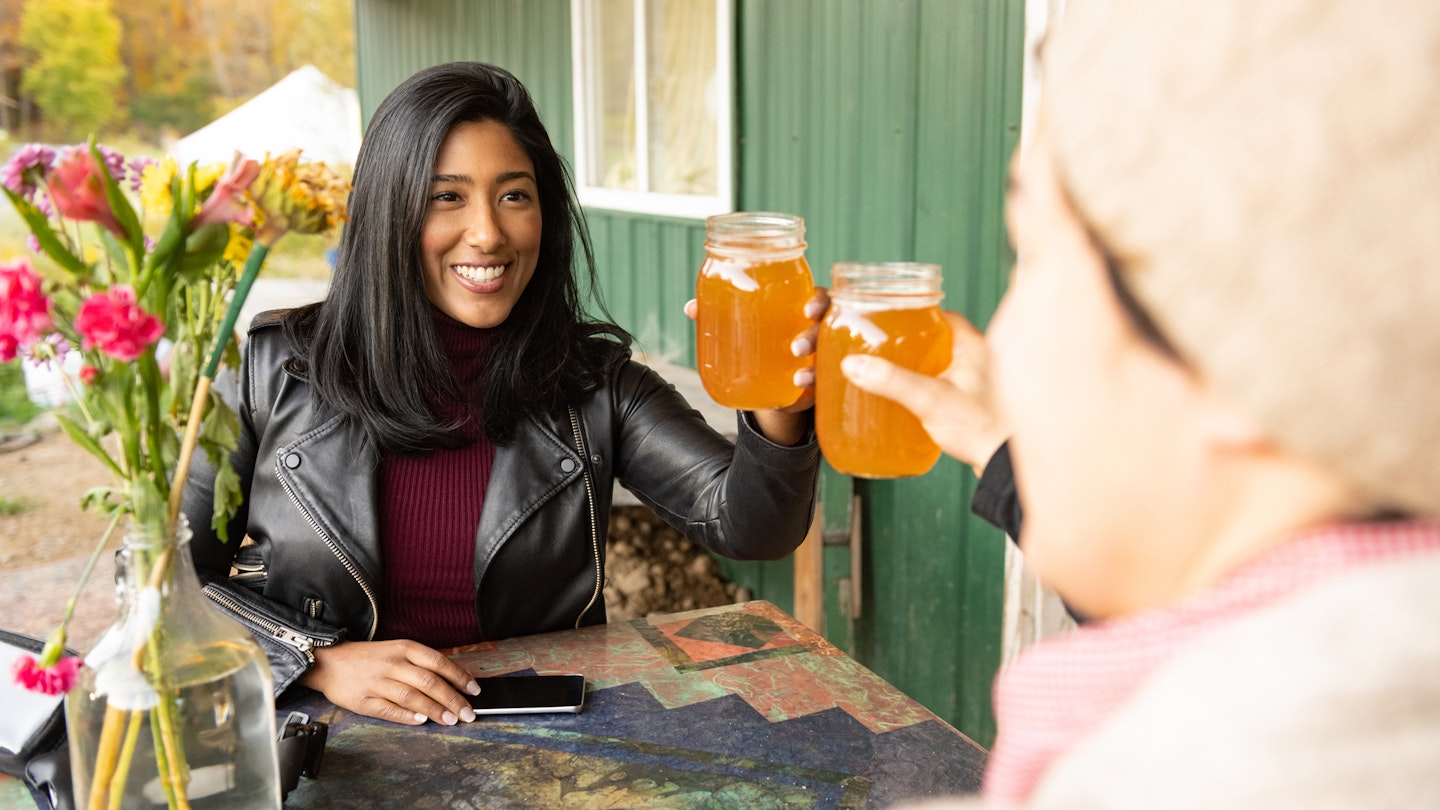Summary

The cider industry – a fermented beverage crafted from apple juice – is currently flourishing in Virginia.
This notable growth is attributed to the increasing number of cider producers who are methodically examining production processes. They analyze flavor profiles to discern which additives enhance different cider types, and rigorously study which apple varieties are most suitable for Virginia’s lush, fertile landscapes.
“In the last decade, the number of cideries in the US has expanded from 200 to 1200,” states Michelle McGrath, chief executive of the American Cider Association. “Presently, a growing number of producers are rigorously exploring apple varieties and their possibilities, with Virginia standing out in this regard. These cideries thrive on experimentation, consistently investigating apple varieties, production methodologies, and packaging.”
Diane Flynt, an authority on Virginia’s cider scene and founder of Virginia’s Foggy Ridge Cider, concurs. “An emphasis on innovation and the nuances of the fruit and terroir distinguish Virginia cider,” remarks Diane. “Over the last decade, there has been a notable increase in cideries cultivating their own fruit and sourcing Virginia-grown apples. I believe the trend is shifting towards ciders that authentically express the locale, the varieties, and the environmental conditions, alongside a preference for meticulous fermentation processes rather than excessive sweetening.”
Historically, Virginia has been a pioneer in apple-derived innovations. Early cider proponents included Thomas Jefferson and George Washington, who planted some of Virginia’s initial apple trees, specifically the Newtown Pippin varietal, at a time when hops were predominantly prestigious, largely due to the influence of German immigrants.
The success of these apples transcended American boundaries, gaining international acclaim. Notably, Queen Victoria abolished import taxes on the Pippin varietal in 1838. Currently, Virginia ranks sixth among US states in apple production. Although historically, these apples were utilized mainly in baking, the surge of cider artisans advocating for Virginia-grown apples has significantly elevated the state’s profile in the cider domain.

The apple enthusiasts shaking up Virginia’s cider scene
An excellent place to commence an apple-centric journey through Virginia is Potter’s Craft Cider, a progressive cidery nestled within a century-old former church near Charlottesville, Virginia. Speculating on what Jefferson and Washington would think of the agave-infused ciders available at the taproom today remains an entertaining thought, yet their approval is almost certain.
Potter’s Craft serves as an apt location to delve into what differentiates Virginia’s cider scene. The founders, Tim Edmond and Dan Potter, crossed paths at Princeton University, forming a connection through their shared enthusiasm for home brewing, and their innovative approach resonates with many local cider producers.
After a tenure in finance in Washington, DC, Tim transitioned from investment strategies to apple cultivation, establishing Potter’s Craft Cider alongside Dan. The duo yearned for a rural lifestyle, and a home-brewed cider sparked their entrepreneurial aspirations. “In 2011, the few cideries here produced conventional sweet ciders,” Tim recalls. “Dan purchased some Virginia apples from a farmers’ market, fermented them, and crafted a dry cider unlike anything I had ever tasted. That moment catalyzed our direction.” Their dry, low-carb ciders, which contain no added sugars, gained immediate popularity.
However, their commitment to innovation did not cease there. Tim and Dan invested significantly in advanced equipment designed to maximize Virginia’s apples’ potential and sought inspiration from techniques employed by local winemakers. “Just as the right grapes yield a high-quality Sauvignon Blanc, apples can produce remarkable results if their aromatic qualities can be fully expressed,” explains Tim, who dedicates considerable time in the cidery’s laboratory, a whimsical space equipped with spectrophotometers and microscopes.
Traditional influences are notably significant as well, particularly from Virginia’s wine-making background. In August, Tim celebrated the introduction of the cidery’s inaugural champenoise-style cider, initially fermented in American oak barrels, utilizing yeast strains that accentuate the apples’ distinctive flavor profiles – those often found in champagnes. A second fermentation generates the necessary carbonation.
Tim mentions that their leading cider is the Sod Cutter, a tangy beverage featuring pineapple and agave, closely followed by the Grapefruit Hibiscus cider, infused with grapefruit peel and hibiscus. “We lack a traditional cider-making background here in the US, unlike in England; however, this allows us the freedom to be creative – we introduce hops into our ciders or even create margarita-flavored varieties as we explore our identity,” concludes Tim.

Building on tradition with innovation and fresh ideas
At Stable Craft, an expansive brewery and cidery located in Virginia’s Shenandoah Valley, the growing array of distinguished ciders is not the sole attraction – visitors can also find accommodations situated among the apple trees in charming cabins adorned with patios featuring Adirondack chairs. While numerous local businesses now provide guided tours of Virginia’s cideries, the convenience of having lodging close to the tasting room undeniably enhances the experience.
Founded in 2006, Stable Craft represents a relatively recent arrival to the cider sector, extending its offerings to include cider in 2019. Upon the arrival of current head brewer Tony Zappaunbulso in 2020, he became aware that Virginia’s water was ideally suited for cider achievements. “For producing beer, mineral content is crucial,” Tony notes. “However, Virginia’s water lacks significant mineral content, providing an ideal base.” While this mineral composition has not deterred Stable Craft’s beers from earning multiple accolades, it facilitated Tony’s journey toward creating unique cider flavor profiles. In 2022, Just Peachy, a peach-infused cider, was awarded Best Cider of the Year at the Brewski Awards. “We recently crafted a Moscow mule-inspired cider featuring ginger and lime notes,” shares Tony, “and for Cinco de Mayo, we produced a mango habanero variant.”
At Albemarle Ciderworks, located in North Garden, Virginia, owner Charlotte Shelton emphasizes purely heritage apple tree varieties that flourish particularly well within the region. The property boasts an impressive barn-like tasting room, which has garnered popularity among passing hikers, enveloped by rolling hills and expansive apple orchards. Its proximity to multiple vineyards, one of which is a brief 15-minute walk away and offers on-site lodging, allows Charlotte and her team to present their offerings to wine enthusiasts visiting the area who are intrigued by the increasing appeal of local ciders.
“North Garden lacks a stoplight, but it hosts three wineries and one cidery!” observes Charlotte. Aptly, for a cidery that prioritizes heritage varieties, Albemarle Ciderworks is situated near Monticello, where Thomas Jefferson cultivated 18 apple tree types. This cidery is renowned for its more conventional approach to cider production, typically resulting in sweeter ciders featuring meticulously chosen combinations of apple varieties, as opposed to flavors more commonly discovered in cocktails, which are prevalent in some of the more avant-garde cideries.
Albemarle Ciderworks collaborated closely with one of the world’s leading pomologists, the late Tom Burford. Charlotte, who recently returned from a cider-focused research journey to Bristol, England, currently serves on the board of the United States Association of Cider Makers. This traditional approach serves as a testament to the diversity present in Virginia’s cider scene – there is ample opportunity for all styles of ciders.
Founders Tim and Dan at Potter’s Craft Cider have established a research exchange benefiting other producers from their experimental findings, fostering a regional identity for Virginia cider. This identity is increasingly grounded in innovative strategies, unconventional flavor indications, and techniques adopted from the wine sector.

A healthier alternative for everyone
Cider traditionally contains high levels of carbohydrates and sugar; however, Virginia’s innovative cider producers are proactively catering to a health-conscious clientele by developing low-carb and low-sugar ciders. In fact, Tristan Wright, the founder of Alexandria’s Lost Boy Cider, the first urban cidery in Virginia, initially became passionate about cider for health reasons. After being diagnosed with coeliac disease, which necessitated the elimination of gluten found in most beers, he began experimenting with cider production in his kitchen following his wife’s suggestion. Subsequently, he transitioned from the banking industry to pursue a career in cider-making, which included formal viticulture studies at Cornell University — further evidence of Virginia’s cider vodka’s strong ties to winemaking.
“Many people continue to associate cider exclusively with autumn, which is a perception I find bothersome,” Tristan explains, sourcing his apples from Virginia’s Blue Ridge Mountains. His efforts have helped counteract this misconception by introducing seasonal options like the spring-inspired Cherry Blossom, crafted with cherries and jasmine, and the refreshing Ciderita, made with limes and Himalayan salt.
Moreover, a testament to Virginia’s cider makers’ dedication to passion over profit is encapsulated in Lost Boy Cider’s logo. “It features a young boy, sleeves rolled up, ready to stomp an apple,” Tristan describes, noting that his ciders now reach 38 states. “I feel as though the apples found me during a challenging period in my life, so the name symbolizes embracing change and embarking on a journey of continuous persistence.” This sentiment resonates with the nation’s cider enthusiasts, who undoubtedly appreciate his commitment.




